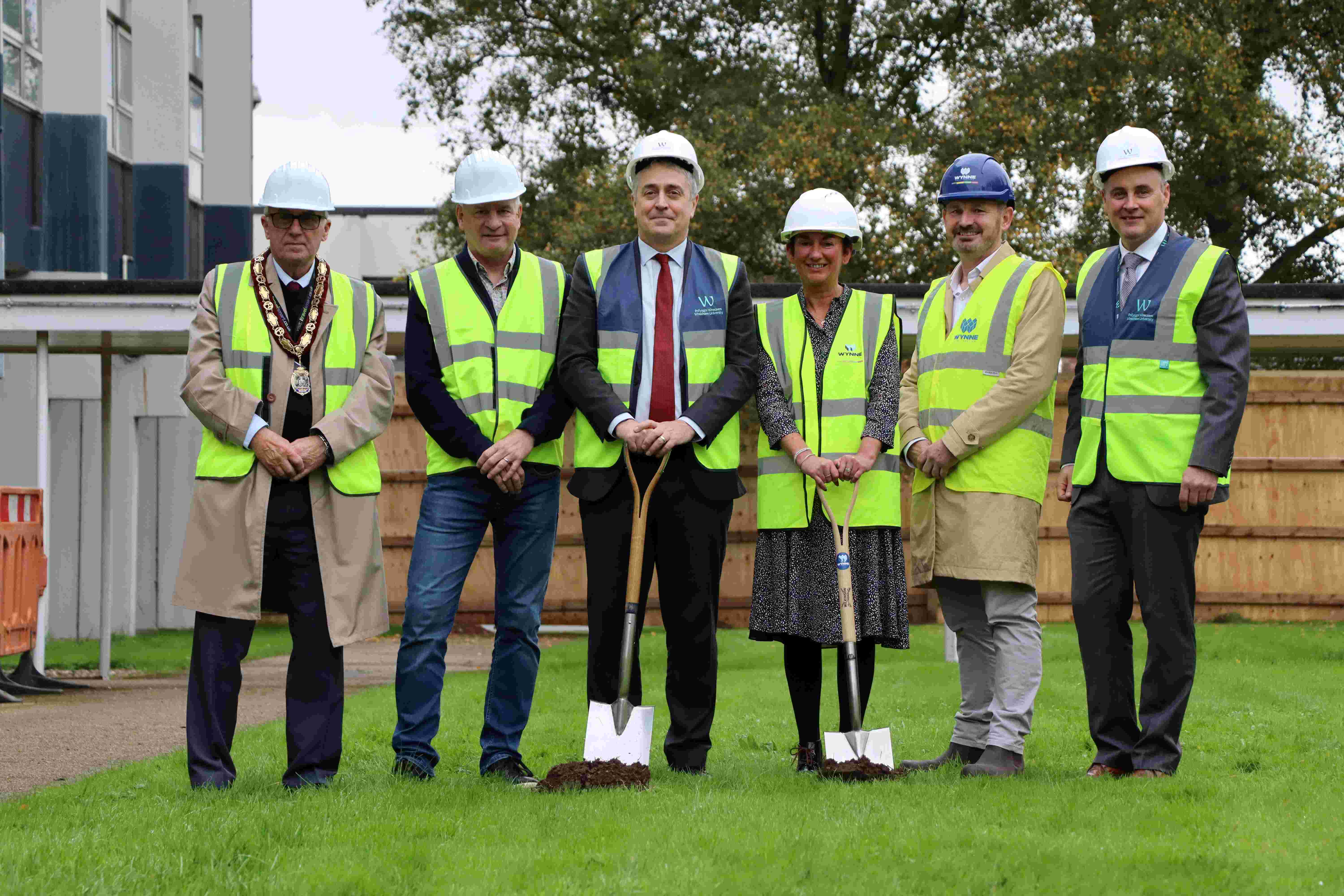Cutting-edge technology will be driving force behind next phase of University’s Health and Education Innovation Quarter

Date: Wednesday, October 9, 2024
Providing students with industry-leading technology and encouraging interprofessional working, in order to prepare them for their chosen professional fields, is going to be the driving force behind the next major campus development taking place at Wrexham University.
The development is the next phase of enhancing the University’s Health and Education Innovation Quarter (HEIQ), which officially opened at the beginning of last year.
The HEIQ has been transformative for healthcare education provision in the region by ensuring that the University is at the cutting-edge of technology-led learning experiences.
The turf cutting ceremony to celebrate the start of the works on the next phase of the HEIQ took place today (Wednesday) at the University, with staff coming together with stakeholders and partners to mark the occasion.
The next phase will take the institution to even further heights – once again, ensuring that industry-leading technology is available to students’ by creating a new immersive teaching environment, which will allow for a combination of both virtual and augmented reality.
There also be construction of a Teaching and Learning Lab and a Hydrasimulation Suite – which is being developed in conjunction with the Hydra Foundation – that will help students with their critical decision-making skills, through simulation of emergency situations, as well as student centred study spaces and a new café.
Construction of this next phase is being carried out by North Wales-based, Wynne Construction, following a competitive tender process.
Dr Caroline Hughes, Associate Dean for Student Engagement at Wrexham University, said: “We are delighted to share this exciting progress regarding our next phase of the HEIQ – and were thrilled to welcome partners and stakeholders to celebrate work on this next phase officially getting underway.
“This next phase will see us continue to strive forward when it comes to providing our students with technology enhanced, immersive learning experiences using devices and software, that will help prepare them for their chosen professions and work collaboratively, as they would in the professional environment.
“These new facilities will enable significant enhancement in our students’ learning experience, and will allow for increased opportunities for interprofessional working.”
Paul Moran, Capital Projects Manager at Wrexham University, said: “We are pleased to have appointed North Wales-based, Wynne Construction as the main contractor of this project, who possess an excellent track record in education works in North Wales and beyond.
“This next phase of our HEIQ is going to make a real impact on our students’ overall experience and learning.”
This scheme is the latest project being delivered as part of the University’s ongoing Campus 2025 strategy – an £80 million investment project to improve and revitalise facilities across the University’s four campuses.
Chris Wynne, Managing Director of Wynne Construction, added: “We’re thrilled to be building another educational facility that will provide students with a state-of-the-art and innovative learning experience.
“We’re also looking forward to continuing our working relationship with Wrexham University and delivering the associated social value benefits such as work experience and opportunities for site visits.”
Completion of this next phase is anticipated for December 2025.
Notes to editors:
Hydrasimulation Suite and Hydra Foundation
The Hydrasimulation suite – developed in conjunction with the Hydra Foundation – will provide a unique learning and teaching environment and is used to conduct immersive, simulated scenarios for a variety of students across programme areas, including Policing, Nursing and Allied Health, Social Work, Business etc.
Developed by Professor Jonathan Crego MBE, Hydra is a training tool that enables the monitoring of group dynamics, real-time leadership and decision making in critical incidents.
Hydra has assisted in the training and decision making of Police Officers, Emergency Personnel, Healthcare professionals, Social Workers, Education, Home Office and the military and private sectors in the UK and internationally.
A Hydra exercise could see students gathering in the plenary room at the start of session for an initial briefing. Following this, they would be split into the five syndicate rooms, from which they would then be engaged in a simulated scenario. Information via audio, video and documentation would be provided to students throughout the scenario from the control room into the syndicate rooms and students would utilise the Hydra software to record decision making accordingly.
Student engagement and progress throughout the exercise would be monitored via supporting/specialist staff from the control room.
Scenarios are immersive and replicate real-life conditions, allowing students to deal with real-life situations in a safe learning environment.